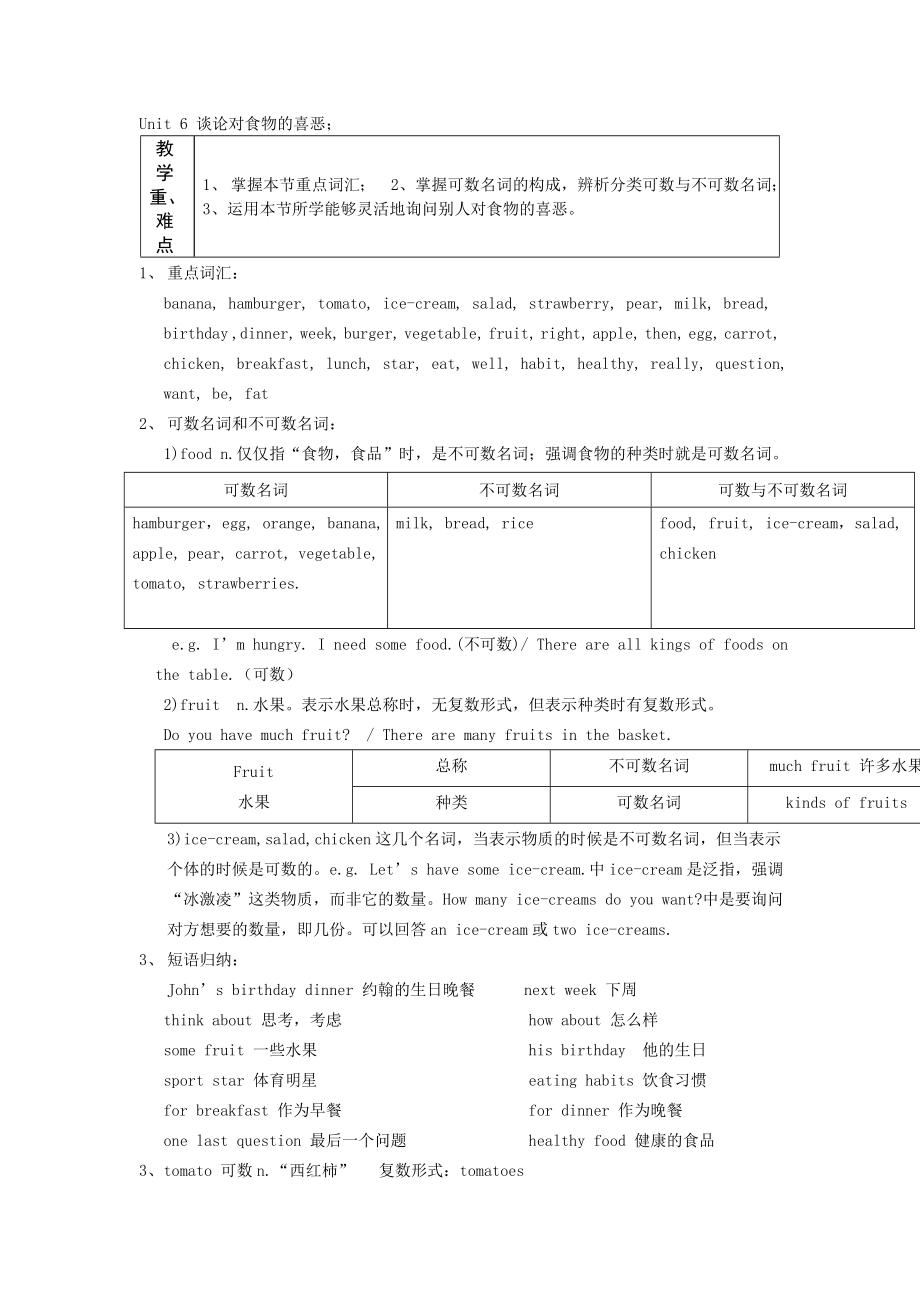《人教版 七年級(jí)上冊(cè) 英語(yǔ)知識(shí)點(diǎn) 全第六單元unit 6 知識(shí)點(diǎn)》由會(huì)員分享���,可在線閱讀����,更多相關(guān)《人教版 七年級(jí)上冊(cè) 英語(yǔ)知識(shí)點(diǎn) 全第六單元unit 6 知識(shí)點(diǎn)(3頁(yè)珍藏版)》請(qǐng)?jiān)谘b配圖網(wǎng)上搜索����。
1、Unit 6 談?wù)搶?duì)食物的喜惡�����;
教學(xué)重���、難點(diǎn)
1�、 掌握本節(jié)重點(diǎn)詞匯�����; 2���、掌握可數(shù)名詞的構(gòu)成�����,辨析分類(lèi)可數(shù)與不可數(shù)名詞����;
3���、運(yùn)用本節(jié)所學(xué)能夠靈活地詢問(wèn)別人對(duì)食物的喜惡��。
1����、 重點(diǎn)詞匯:
banana, hamburger, tomato, ice-cream, salad, strawberry, pear, milk, bread, birthday ,dinner, week, burger, vegetable, fruit, right, apple, then, egg, carrot, chicken, breakfast, lunch, star, eat,
2����、well, habit, healthy, really, question, want, be, fat
2、 可數(shù)名詞和不可數(shù)名詞:
可數(shù)名詞
不可數(shù)名詞
可數(shù)與不可數(shù)名詞
hamburger�����,egg, orange, banana, apple, pear, carrot, vegetable, tomato, strawberries.
milk, bread, rice
food, fruit, ice-cream��,salad, chicken
1)food n.僅僅指“食物,食品”時(shí)�,是不可數(shù)名詞;強(qiáng)調(diào)食物的種類(lèi)時(shí)就是可數(shù)名詞��。
e.g. I’m hu
3�����、ngry. I need some food.(不可數(shù))/ There are all kings of foods on the table.(可數(shù))
2)fruit n.水果���。表示水果總稱(chēng)時(shí)��,無(wú)復(fù)數(shù)形式����,但表示種類(lèi)時(shí)有復(fù)數(shù)形式��。
Do you have much fruit? / There are many fruits in the basket.
Fruit
水果
總稱(chēng)
不可數(shù)名詞
much fruit 許多水果
種類(lèi)
可數(shù)名詞
kinds of fruits
3)ice-cream, salad, chicken這幾個(gè)名詞��,當(dāng)表示物質(zhì)的時(shí)候是不可數(shù)名詞���,但
4�、當(dāng)表示個(gè)體的時(shí)候是可數(shù)的�。e.g. Let’s have some ice-cream.中ice-cream是泛指��,強(qiáng)調(diào)“冰激凌”這類(lèi)物質(zhì)���,而非它的數(shù)量。How many ice-creams do you want?中是要詢問(wèn)對(duì)方想要的數(shù)量��,即幾份�����?��?梢曰卮餫n ice-cream或two ice-creams.
3、 短語(yǔ)歸納:
John’s birthday dinner 約翰的生日晚餐 next week 下周
think about 思考���,考慮 how about 怎么樣
some fruit 一些水果
5����、 his birthday 他的生日
sport star 體育明星 eating habits 飲食習(xí)慣
for breakfast 作為早餐 for dinner 作為晚餐
one last question 最后一個(gè)問(wèn)題 healthy food 健康的食品
3�����、tomato 可數(shù)n.“西紅柿” 復(fù)數(shù)形式:tomatoes
類(lèi)似的以o結(jié)尾的名詞����,需加–es 構(gòu)成復(fù)數(shù)形式的單詞還有potato, hero但p
6�����、hoto 等詞而是以加—s構(gòu)成復(fù)數(shù)形式的�����。
可以這樣記:有生命的名詞�����,變復(fù)數(shù)詞尾加-es���,e.g. potato,hero��;無(wú)生命的詞尾加-s���,e.g. photo.
4���、 詢問(wèn)某人的喜好,通常用一般疑問(wèn)句:Do/does + 主語(yǔ) + like + …?句型�。
肯定回答用:Yes,主語(yǔ) + do/does.
否定回答用:No,主語(yǔ) + don’t /doesn’t�����。(其中����,do/does 為助動(dòng)詞)���。
----Do you like the sweater ?
----Yes, I do.
----Does he like the pen ?
----No, he doesn
7、’t.
5����、 Do you like bananas?
1)bananas 是banana 的復(fù)數(shù)形式,表示一類(lèi)事物�;在英語(yǔ)中,常用復(fù)數(shù)形式表示一類(lèi)事物時(shí)���,其前不用定冠詞the�。 e.g. Do they like computer games?
2)like sb./sth. 喜歡某人或某物 e.g. I like this ruler?/I like them.
like to do sth. 喜歡做某事(表示一次性的或不經(jīng)常的喜歡)e.g. She likes to play with her little sister.
like doing sth.喜歡
8��、做某事(經(jīng)常性的喜歡) e.g. He likes playing the guitar.
5��、Hey, John’s birthday dinner is next week 約翰的生日宴會(huì)在下周�。
1)John’s birthday dinner 約翰的生日宴會(huì)���。John’s 是名詞所有格形式,用于表示所屬關(guān)系����。
e.g. This is Jim’s sister./It is Tom’s pen.
2)next week 下周
e.g. Teacher’s Day is next week.
6、think about 考慮
e.g. L
9�、et’s think about the eggs./ Let’s think about the food.
7、How about…?====What about…? ……怎么樣��?���,用于提出建議或請(qǐng)求��。其中about是介詞��,后接n./ pron./v-ing.
e.g. How about him? / How about having some bread?
擴(kuò)展:英語(yǔ)中常用于提建議的句型還有:
1)Let’s …. 讓我們……吧�。 e.g. Let’s have some apples.
2) Why not…? 為什么不……呢���? e.
10�����、g. Why not ask our teacher?
8����、some “一些”,用于修飾可數(shù)名詞��,也可用來(lái)修飾不可數(shù)名詞����。一般用于肯定句中。但當(dāng)表示建議或請(qǐng)求����,并希望對(duì)方給予肯定回答時(shí),句中也用some,而不用any.
any 一般用于否定句疑問(wèn)句中���。
e.g. I have some apples./He has some milk./Would you like some orange juice?
I don’t have any pears./Do you have any milk?
9、Let’s have strawberries and apples th
11�、en.
1)strawberries 是可數(shù)名詞strawberry的復(fù)數(shù)形式,其變化是將詞尾y變?yōu)镮,再加es.
2)have v.“有���,吃�、喝”�����。英語(yǔ)中,習(xí)慣上用have breakfast/lunch/supper/dinner來(lái)表示吃早飯�����、午飯�����、晚飯.表示吃具體食物時(shí)����,可與eat替換。
e.g. Let’s have /eat some apples.
10�、so 連詞,“因此���,所以”不可與because同時(shí)出現(xiàn)在一個(gè)句子中��。
e.g. I’m ill today, so I can’t go to school.
11�、well adv“好”�,在課
12、文中是修飾動(dòng)詞eat.
】辨析 well 和 good
兩者都意為“好”����,但其用法不同��。
well
形容詞
放在連系動(dòng)詞后�����,表達(dá)“健康的”意思
I’m very well.我很好�。
副詞
修飾動(dòng)詞
We eat well.我們吃的很好���。
good
形容詞
放在名詞前作定語(yǔ)��,或放在連系動(dòng)詞后作表語(yǔ)
She is a good girl.
12����、for prep.“為�,替,給”可以表示用途���、對(duì)象、目的����、愿望,等。
e.g. Let’s get a new light for the bedroom./ let’s go out for a walk./
13�����、Good luck for you.
( )Mary often has eggs and bread _____breakfast.
A.with B. for C. on
13���、really adv. “事實(shí)上����,真正地”���,用于加強(qiáng)語(yǔ)氣��,表示程度��,放在動(dòng)詞前����。real adj.“真的”
e.g. I really don’t know./Hi, Joe, is it really you?
That is not her real name.
14�����、after dinner 用餐后
dinner n.“正餐���,晚餐”常用來(lái)表示 一天中的
14���、正餐(main meal),英語(yǔ)國(guó)家晚餐一般是一天中最豐富的一餐����,因此dinner常用來(lái)指晚餐�����。而supper只指晚餐�。此外,dinner一詞比較正式����,邀請(qǐng)朋友赴宴常用它。
e.g. We’ll have dinner together in the evening.
15���、want v.“想”
1)want sth.想要某物 e.g. I want an apple.
2)want to do sth. 想要去做某事 e.g. I want to eat an apple.
3)want sb. to do sth.想要某人做某事 e.g. I want you to help me.
 人教版 七年級(jí)上冊(cè) 英語(yǔ)知識(shí)點(diǎn) 全第六單元unit 6 知識(shí)點(diǎn)
人教版 七年級(jí)上冊(cè) 英語(yǔ)知識(shí)點(diǎn) 全第六單元unit 6 知識(shí)點(diǎn)

